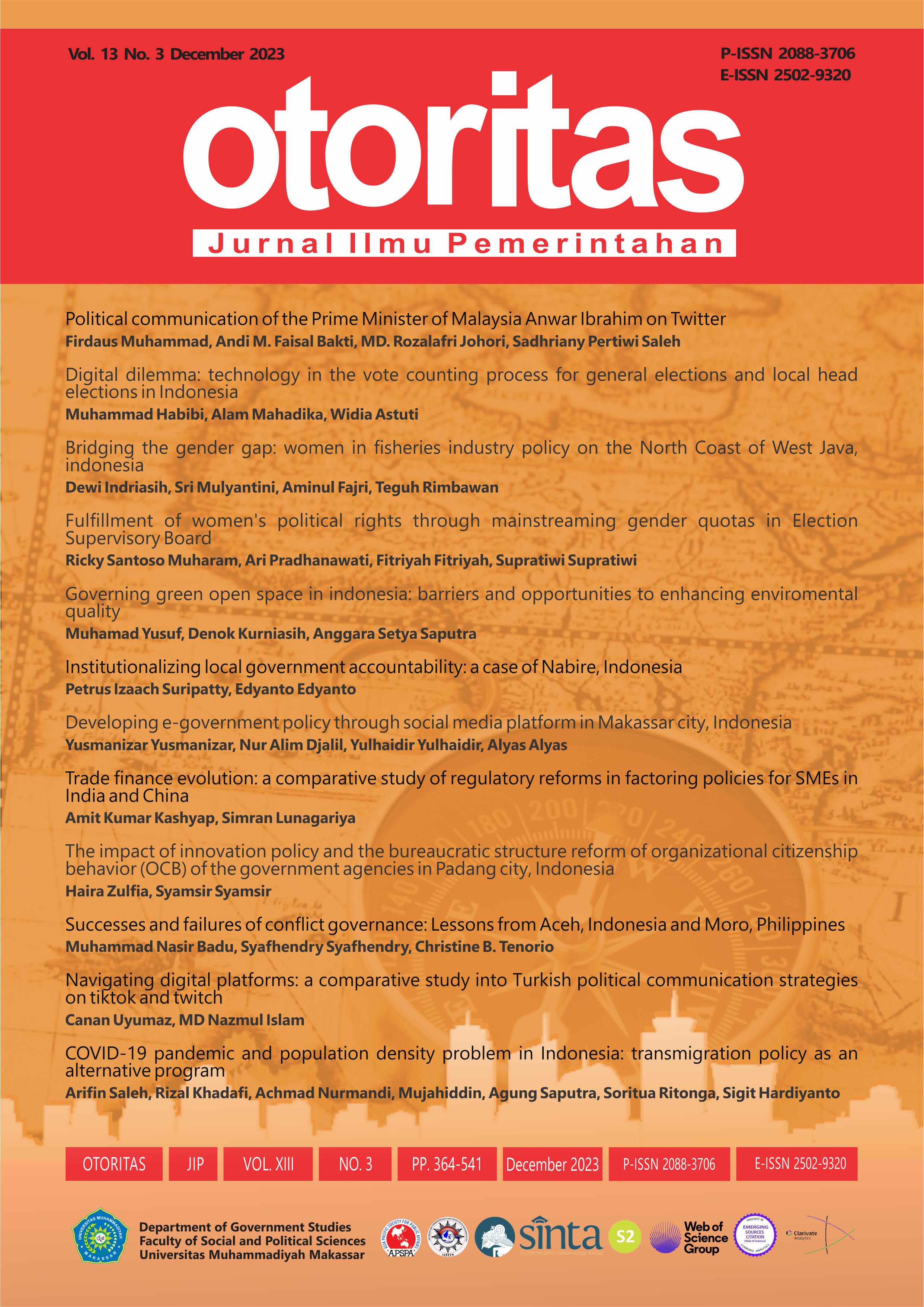Successes and failures of conflict governance: Lessons from Aceh, Indonesia and Moro, Philippines
DOI:
https://doi.org/10.26618/ojip.v13i3.12991Keywords:
ethno-nationalism, conflict governance, Aceh, MoroAbstract
The purpose of this study is to analyze ethnic conflict management in Aceh (Indonesia) and Moro (Philippines) conflicts. The Aceh conflict was considered resolved after the signing of the Helsinki agreement, which was mediated by the Crisis Management Initiative (CMI), an international NGO based in Finland, on 15 August 2005 between Indonesian government and the Free Aceh Movement (Gerakan Aceh Merdeka, GAM). Meanwhile, the Moro (Philippines) conflict is still ongoing despite the TRIPOLI agreement signed and mediated by the OIC (Organization of Islamic Conference) between the Philippine government and the Moro National Liberation Front (MNLF) on 23 December 1976 and also with the MILF in 2001. This research method uses a qualitative approach. Primary data was obtained through interviews with figures who were considered competent in the Aceh conflict and the Moro conflict. The results of this study show that CMI in Aceh has succeeded in changing the situation of ethnic conflict into a situation that can reduce and reduce escalation and direct conflict actors towards conflict resolution. Peacemaking, peacekeeping and peace building have been played well by CMI involving the international community such as ASEAN and the European Union to manage the conflict. Meanwhile, in Moro the OIC failed to bring the conflict actors to solve their problems. The Philippine government lacks a robust vision, framework, and the necessary political will to effectively address the Moro conflict, which is of concern to the Organization of Islamic Cooperation (OIC).
References
Badu, M. N. (2011). Ethnic Conflict in Southeast Asia: A Comparative Study of Aceh (Indonesia) and Moro (Philippines).
Blagojevic, B. (2010). Causes of Ethnic Conflict: A Conceptual Framework. Journal of Global Change & Governance, 3(1).
Buendia, R. G. (2005). The state‐ Moro armed conflict in the Philippines Unresolved national question or question of governance? Asian Journal of Political Science, 13(1), 109–138. https://doi.org/10.1080/02185370508434252
Dewi Fortuna Anwar, & Masri Maris. (2005). Konflik kekerasan internal tinjauan sejarah, ekonomi politik, dan kebijakan di Asia Pasifik. Universitas Indonesia Library; Yayasan Obor Indonesia. https://lib.ui.ac.id
Easterly, W. (2001). Can institutions resolve ethnic conflict? Economic Development and Cultural Change, 49(4), 687–706.
Harff, B. (2018). Ethnic conflict in world politics. Routledge.
Hopmann, P. Terrence and Philipp Lustenberger. (2011). Conflict Management in Mindanao, the Paper presented for International Association for Conflict Management Conference, in Istanbul, Turkey. Https://papers.ssrn.com/sol3/papers.cfm?abstract_id=1872224
James C. Murdoch, & Todd Sandler. (2002). Economic Growth, Civil Wars, and Spatial Spillovers—JAMES C. MURDOCH, TODD SANDLER, 2002. https://journals.sagepub.com/doi/10.1177/0022002702046001006
Jinadu, L. A. (2007). Explaining & managing ethnic conflict in Africa: Towards a cultural theory of democracy. Department of Peace and Conflict Research, Uppsala University [u.a.].
Kay, Kira. (2003). The New Humanitarian: The Henry Dunant Center and the Aceh Peace Negotiations. WWS Case Study.
Kriesi, H., Grande, E., Dolezal, M., Helbling, M., Höglinger, D., Hutter, S., & Wüest, B. (2012). Political conflict in western Europe. Cambridge University Press.
Levine, Shaun D. (2004). Confronting the Gerakan Aceh Merdeka: Insights into GAM‟s recent decision to drop its independence stance, exploring GAM‟s shift towards autonomy. Tesis MA. Political Science, Northern Illinois University: T.pt.
Marsella, A. J. (2005). Culture and conflict: Understanding, negotiating, and reconciling conflicting constructions of reality. International Journal of Intercultural Relations, 29(6), 651–673. https://doi.org/10.1016/j.ijintrel.2005.07.012
Muslim, M. A. (1994). The Moro Armed Struggle in the Philippines: The Nonviolent Autonomy Alternative. Office of the President and College of Public Affairs, Mindanao State University.
Nafzyger, E Wayne. (2002). The prevention of humanitarian emergencies /. https://digitallibrary.un.org/record/473012?ln=en
Paul Collier, & Anke Hoeffler. (2000). Greed and Grievance in Civil War. https://openknowledge.worldbank.org/handle/10986/18853
Peter Harris, & Ben Reilly. (2000). Demokrasi dan konflik yang mengakar: Sejumlah pilihan untuk negosiator. IDEA.
Rivera. (1994). Armed challenges to the Philippines government: Protracted war or political settlement? Southeast Asian Affairs. Singapore: Institute of Southeast Asian Studies.
Ross, M. L. (2004). How Do Natural Resources Influence Civil War? Evidence from Thirteen Cases. International Organization, 58(1), 35–67. https://econpapers.repec.org/article/cupintorg/v_3a58_3ay_3a2004_3ai_3a01_3ap_3a35-67_5f58.htm
Schulze, K. E. (2004). The Free Aceh Movement (GAM): Anatomy of a Separatist Organization.
Stein, A. A. (2019). Ethnicity, extraterritoriality, and international conflict. In Affect, Interest and Political Entrepreneurs in Ethnic and Religious Conflicts (pp. 40–58). Routledge.
Stephen Ryan. (1990). Ethnic conflict and international relations | WorldCat.org. https://search.worldcat.org/title/ethnic-conflict-and-international-relations/oclc/21950281
Tan, A. (2000). Armed rebellion in the ASEAN states: Persistence and implications. Australian National University.
Tan, A. T. H. (2007). Terrorism and insurgency in Southeast Asia. In A. T. H. Tan (Ed.), A handbook of terrorism and insurgency in Southeast Asia (pp. 3–25). Edward Elgar Publishing. http://www.scopus.com/inward/record.url?scp=84881842216&partnerID=8YFLogxK
Tony Addison, & S Mansood Murshed. (2002). Credibility and Reputation in Peacemaking. https://ideas.repec.org/a/sae/joupea/v39y2002i4p487-501.html
Vayrynen, Tarja. (2000). Culture and international conflict resolution: A critical analysis of the work of John Burton—James Madison University.
Downloads
Published
Issue
Section
License
The Editorial Team of Otoritas: Jurnal Ilmu Pemerintahan reserves the right to transfer the copyright of the article once it has been accepted and a decision has been made to publish it.
Department of Government Studies, Faculty of Social and Political Sciences, Universitas Muhammadiyah Makassar in collaboration with Muhammadiyah’s College Association of Government Studies (AIPPTM) and Asia Pacific Society for Public Affairs (APSPA) as the publisher of Otoritas: Jurnal Ilmu Pemerintahan holds the copyright of all articles published in this journal.
The Publisher holds the right to reproduce and distribute the article and author is not allowed to publish the same article published in this journal.
Statement of Authenticity and Manuscript Copyright can be downloaded: here
After filling in the statement letter, please send via e-mail: otoritas@unismuh.ac.id






